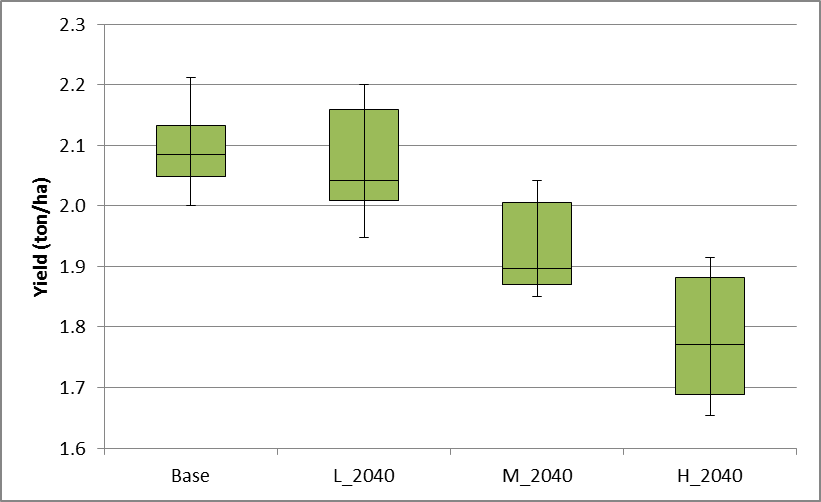The project prepares robust climate mitigation and adaptation pipelines aligned with the Paris Agreement and responsive to DMCs climate change priorities. The TA will support interventions on departmental, sectoral and country levels with key activities including development of a regional strategy, upstream climate assessments, climate pipeline development, government dialogues and capacity building. As part of this project, FutureWater conducts a regional climate risk assessment for ten countries. This includes an assessment of baseline and future climate hazards, exposure and vulnerability and addressing sectoral impacts and adaptation options for a wide range of sectors. In addition country profiles summarizing climate risks for the ten countries are generated. The reginal climate risk assessment feeds into the climate strategy.
The Paris Agreement requests each country to outline and communicate their post-2020 climate actions, known as their NDCs. These embody efforts by each country to reduce national emissions and adapt to the impacts of climate change. As ratifying parties, Armenia, Georgia and Uzbekistan must therefore outline how they intend to implement their NDCs and provide information on what the focus of this spending will be. To support this effort, the Asian Development Bank (ADB) is implementing a knowledge and support technical assistance cluster which will help enhance capacities of developing member countries (DMCs) in meeting their climate objectives by assisting in refining and translating nationally determined contributions (NDCs) into climate investment plans.
In this work package, ADB aims to support Georgia, Armenia, and Uzbekistan with the implementation of their NDCs through developing urban climate assessments (UCAs) and mainstreaming low carbon and climate resilience measures into urban planning processes. FutureWater contributed to this effort by supporting knowledge creation in relation to climate change and adaptation which will help each country to make more informed climate investment decisions.This was accomplished by conducting analysis of downscaled climate model ensembles for different climate change scenarios and synthesising data related to urban climate risk.
Climate change trend assessments were conducted using the NASA-NEX downscaled climate model ensemble combined with ERA-5 climate reanalysis products. To determine climate risk at the urban level, a number of openly available datasets were analysed and compiled using a spatial aggregation approach for 16 cities in the area. Results were presented as user-friendly climate risk profiles at the national and urban scales, allowing for insights into climate trends and risks over the coming century. These will be presented to non-expert decision makers to help support Armenia, Georgia and Uzbekistan develop targeted and informed NDCs.
This project will build capacity in the hydro-meteorological professionals in Armenia in using appropriate models for projections of climate change impacts and vulnerability in priority sectors and areas of the country. The technical assistance in vulnerability modelling will fill the gaps in vulnerability assessment with projections in the priority areas in order to facilitate identification of proper adaptation measures in them. The priority areas that need the most attention are water resources, agriculture and water-related disasters.
The target group of the technical assistance will be the specialists from hydro-meteorological offices, Agricultural Universities or affiliated scientific centres and other Armenian entities from relevant sector(s). To ensure success of the technical assistance the selected professionals should have expertise in Climate Change subjects, particularly in adaptation, and good technical knowledge of their sector(s) and models.
The project will enable the country’s hydro-meteorological professionals to have properly selected, – based on the country’s specifics, – modelling tool(s) for assessing vulnerability of the priority sector(s), and the capacity of using it in practice. The professionals will also gain capacity in using methods for filling gaps in the data collection process. This capacity will ensure identification of proper adaptation measures for the sectoral adaptation plan to climate change.
The project activity consists of two steps/tasks to be implemented in sequential order:
- Selection of a modelling tool/software for vulnerability assessment of the priority areas (agriculture, water resources, and optionally the related natural extreme events)
- Training of hydro-meteorological professionals in use of the selected modelling tool/software for vulnerability assessment of the priority sectors/areas
Task 1 ended with the selection of the modelling tool AquaCrop. FutureWater will now provide training in Armenia by:
- Enhancing the professional’s capacity in the data collection process (improving accessibility to data, methods for estimation for missing data)
- Providing hands-on training of the professionals in the model/tool use (including conduction of vulnerability assessment for relevant sector(s) and the analysis of the results)
Agriculture continues to be critical for poverty reduction, employment, economic growth and food security in Europe and Central Asia (ECA). Agricultural production, processing, and related services remain an important source of income in many ECA countries (approaching 30% of GDP in Central Asia). However, the agricultural sector is highly climate sensitive and potential adverse changes in temperature, precipitation and the frequency of extreme events as a result of climate change are likely to increase the vulnerability of poor rural communities. The World Bank’s ECA Region is working with client countries through an innovative regional, multi-year program of analytical and advisory activities (AAA) on reducing vulnerability to climate change in ECA agricultural systems.
This study contributes to the agriculture sector climate change impact assessment and adaptation and mitigation strategy identification and evaluation. The study encompasses the three countries of the Southern Caucasus region: Armenia, Azerbaijan, and Georgia. The project also includes components for capacity building among in-country staff, and support of the World Bank team’s awareness raising, communication, and dissemination goals for climate change.

Impact of climate change on wheat yield in Armenia based on Aquacrop in 2040-2050. Base = current situation; L, M, H are Low, Medium and High climate change scenarios
FutureWater undertakes the analysis using AquaCrop for the most important crops in the region. Impact assessment and potential adaptation strategies have been assessed. Capacity building and awareness rising have been an integrated component of the activities.
